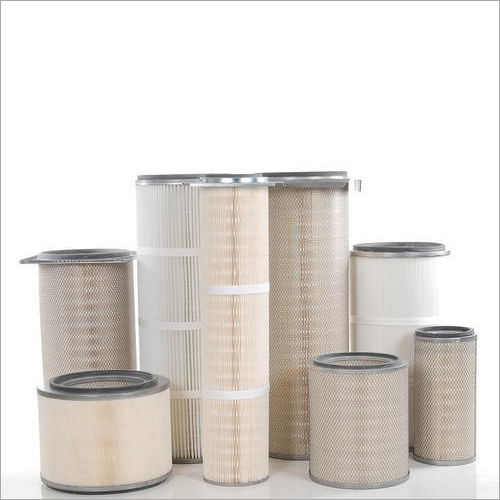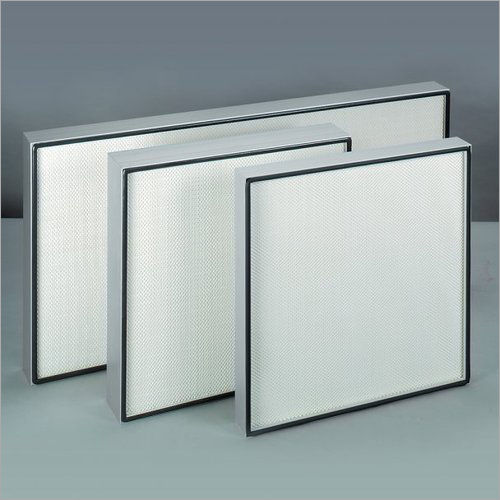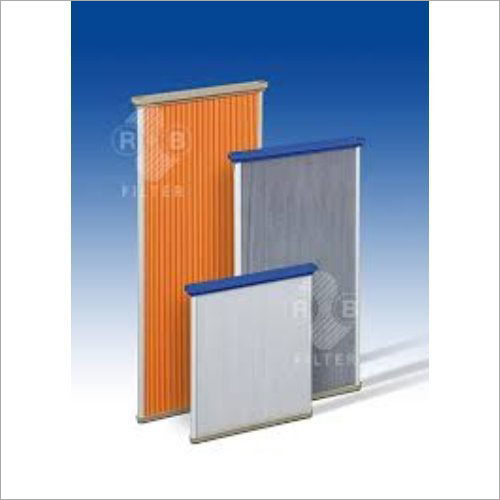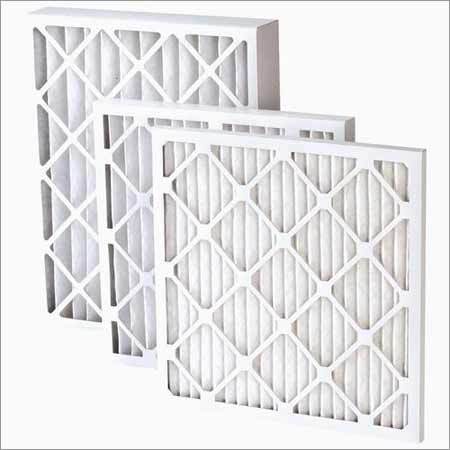GST : 24AADCR2517B1Z0

Dust Collector Filter
5000 INR/Unit
Product Details:
- Condition New
- Usage For Pollution control
- Material Polyester
- Size As per customer requirement
- Diameter 115-327 Millimeter (mm)
- Product Type Dust Collector Filter
- Construction Cartridge Filter
- Click to view more
X
Dust Collector Filter Price And Quantity
- 5000 INR/Unit
- 5 Unit
Dust Collector Filter Product Specifications
- Polyester
- New
- Dust Collector Filter
- Standard
- As per customer requirement
- For Pollution control
- 260 GSM (gm/2)
- 115-327 Millimeter (mm)
- Against Manufacturing defects
- White and Silver
- Cartridge Filter
- Cylindrical
Dust Collector Filter Trade Information
- Nhava Sheva
- Cash in Advance (CID), Cheque
- 35000 Unit Per Year
- 4 Week
- Contact us for information regarding our sample policy
- Corrugated Box Packing
- Asia, Australia, Middle East, Africa
- ISO 9001 : 2015 Certified Company
Product Description
A dust collector filter is a necessary tool for keeping a workstation clean and secure. It is designed to effectively absorb and retain even the smallest particles, maintaining clean air free of dangerous contaminants. This Dust Collector Filter was expertly crafted from premium materials and is designed to resist demanding industrial use while providing dependable performance. Its unique design offers the best possible airflow, boosting its ability to capture dust without sacrificing efficiency. You may easily integrate the user-friendly design into the majority of common dust collection systems, saving you important time and effort.
Dust Collector Filter Applications:
- Woodworking Shops: Woodworking facilities generate a significant amount of sawdust and wood particles during cutting, sanding, and shaping processes. Dust collector filters help to capture these particles, preventing them from contaminating the air and posing health hazards to workers.
- Metalworking and Fabrication: Metalworking operations such as welding, grinding, and cutting produce fine metal particles and fumes that can be harmful if inhaled. Dust collector filters trap these particles, reducing the risk of respiratory problems and maintaining air quality in the workspace.
- Food Processing: Dust collector filters play a crucial role in maintaining hygiene standards in food processing facilities by capturing airborne food particles, spices, and other contaminants. They help prevent cross-contamination and ensure compliance with food safety regulations.
- Pharmaceutical and Chemical Industries: Dust collector filters are used to capture hazardous dust, powders, and vapors generated during the production of pharmaceuticals, chemicals, and other industrial products. They help protect workers from exposure to potentially harmful substances and maintain clean air in the manufacturing environment.
- Construction Sites: Dust generated from construction activities such as cutting, drilling, and sanding can contain harmful substances like silica dust. Dust collector filters are used to control dust emissions on construction sites, safeguarding the health of workers and nearby residents.
- Mining Operations: Dust collector filters are employed in mining operations to control dust generated during drilling, blasting, and material handling processes. They help reduce the risk of respiratory diseases among miners and improve air quality in mining facilities.
- Textile Manufacturing: Textile mills and garment factories produce airborne fibers, lint, and dust particles during spinning, weaving, and processing operations. Dust collector filters help capture these particles, preventing contamination of finished products and maintaining a clean working environment.
- Grain Handling and Agriculture: Grain handling facilities and agricultural operations can generate dust containing allergens, mold spores, and pesticides. Dust collector filters are used to mitigate the risks associated with exposure to airborne contaminants and ensure a safe working environment for workers.
- Foundries and Metal Casting: Foundries and metal casting facilities produce dust and fumes containing metal oxides, silica, and other hazardous substances. Dust collector filters are essential for capturing these pollutants and preventing them from being released into the atmosphere.
- Power Plants and Energy Production: Dust collector filters are used in power plants and energy production facilities to capture ash, soot, and other particulate matter emitted from combustion processes. They help reduce air pollution and comply with environmental regulations.
Dust Collector Filter FAQ:
Q. How does a dust collector filter work?
Ans: Dust collector filters work by using various mechanisms such as filtration, inertial separation, and electrostatic precipitation to capture dust particles from the air passing through the system. The captured dust is then collected and removed from the air stream.
Q. What are the different types of dust collector filters?
Ans: Common types of dust collector filters include fabric filters (baghouse filters), cartridge filters, cyclone separators, electrostatic precipitators, and wet scrubbers. Each type has its own advantages and is suitable for different applications.
Q. What factors should I consider when choosing a dust collector filter?
Ans: Factors to consider include the type and size of dust particles to be captured, the airflow volume and velocity, the temperature and humidity of the air stream, the space available for installation, maintenance requirements, and regulatory compliance.
Q. How often should dust collector filters be replaced or cleaned?
Ans: The frequency of filter replacement or cleaning depends on factors such as the type of dust being collected, the operating conditions of the dust collector system, and the manufacturers recommendations. Regular inspection and monitoring of filter performance are essential to determine when maintenance is needed.
Q. How do I know if my dust collector filter needs replacement?
Ans: Signs that a dust collector filter may need replacement include reduced airflow, increased pressure drop across the filter, visible dust emissions from the exhaust, and poor air quality in the workspace. Regular monitoring of filter performance and periodic inspections can help identify when filters need to be replaced.
Q. Can I clean dust collector filters, or do I need to replace them?
Ans: Some types of dust collector filters can be cleaned using methods such as reverse air pulsation, mechanical shaking, or washing, while others may need to be replaced when they become clogged or reach the end of their service life. The cleaning or replacement method depends on the type of filter and the manufacturers recommendations.
Q. Are there any safety considerations when handling dust collector filters?
Ans: Yes, safety precautions should be followed when handling dust collector filters, especially if they contain hazardous dust or if they have been exposed to toxic substances. Proper personal protective equipment (PPE) should be worn, and appropriate handling procedures should be followed to minimize exposure risks.
Q. How can I optimize the performance of my dust collector filter system?
Ans: Optimizing dust collector filter performance involves proper system design, regular maintenance, monitoring of airflow and pressure drop, timely filter replacement or cleaning, and ensuring compliance with applicable regulations and standards.
Efficient Pollution Control
Designed specifically for pollution control, this dust collector filter meets industrial standards to ensure clean air and a safer workplace. The cartridge construction provides a high filtration surface area, effectively trapping dust and particles.
Customizable and Durable Design
Tailored to your unique requirements, our filters come in various sizes, weights, and diameters. Constructed from premium polyester, they offer excellent durability and withstand continuous industrial use without compromising performance.
Peace of Mind with Warranty
Every filter comes with a warranty against manufacturing defects, reflecting our commitment to quality. Trust in a reliable solution that is engineered to last, with prompt support in case you experience any product issues.
FAQs of Dust Collector Filter:
Q: How is the dust collector filter used for pollution control?
A: This cylindrical cartridge filter is designed to trap dust and airborne particles in various industrial applications, helping ensure environmental compliance and a safer work environment.Q: What are the material and construction details of this filter?
A: The filter is constructed from durable polyester and features a cylindrical, cartridge-style design. It is available in white and silver colors, optimized for robust industrial performance.Q: When should I replace or maintain the dust collector filter?
A: Replacement depends on usage intensity and dust load, but regular inspection is suggested. Change or clean the filter as soon as you notice decreased performance or visible dust buildup.Q: Where is this dust collector filter manufactured and supplied from?
A: This product is manufactured, exported, and supplied from India by a trusted manufacturer known for quality industrial filtration solutions.Q: What is the process of ordering a customized filter size?
A: You can specify required dimensions when placing an order. Our team will manufacture the filter in accordance with your specified size and deliver as per your need.Q: What are the primary benefits of using this dust collector filter?
A: Benefits include effective dust and pollution control, durability owing to its polyester material, customizable sizing, and a warranty against manufacturing defects for assured peace of mind.Q: Is there any warranty provided with the dust collector filter?
A: Yes, the filter comes with a warranty specifically against manufacturing defects, offering added security and support for your investment.Tell us about your requirement

Price:
Quantity
Select Unit
- 50
- 100
- 200
- 250
- 500
- 1000+
Additional detail
Mobile number
Email







 Call Me Free
Call Me Free
 English
English Spanish
Spanish French
French German
German Italian
Italian Chinese (Simplified)
Chinese (Simplified) Japanese
Japanese Korean
Korean Arabic
Arabic Portuguese
Portuguese